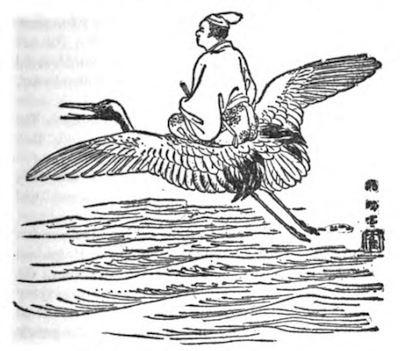The Man Who Did Not Wish to Die (cont.)
Sentaro reached the shrine and prayed for seven days, entreating Jofuku to show him the way to a hermit who could give him what he wanted so much to find.At midnight of the seventh day, as Sentaro knelt in the temple, the door of the innermost shrine flew open, and Jofuku appeared in a luminous cloud and, calling to Sentaro to come nearer, spoke thus:
"Your desire is a very selfish one and cannot be easily granted. You think that you would like to become a hermit so as to find the Elixir of Life. Do you know how hard a hermit's life is? A hermit is only allowed to eat fruit and berries and the bark of pine trees; a hermit must cut himself off from the world so that his heart may become as pure as gold and free from every earthly desire. Gradually after following these strict rules, the hermit ceases to feel hunger or cold or heat, and his body becomes so light that he can ride on a crane or a carp, and he can walk on water without getting his feet wet.
"You, Sentaro, are fond of good living and of every comfort. You are not even like an ordinary man, for you are exceptionally idle, and more sensitive to heat and cold than most people. You would never be able to go barefoot or to wear only one thin dress in the winter time! Do you think that you would ever have the patience or the endurance to live a hermit's life?
"In answer to your prayer, however, I will help you in another way. I will send you to the country of Perpetual Life, where death never comes — where the people live forever!"
Saying this, Jofuku put into Sentaro's hand a little crane made of paper, telling him to sit on its back and it would carry him there.
Sentaro obeyed wonderingly. The crane grew large enough for him to ride on it with comfort. It then spread its wings, rose high in the air, and flew away over the mountains right out to sea.
Sentaro was at first quite frightened, but by degrees he grew accustomed to the swift flight through the air. On and on they went for thousands of miles. The bird never stopped for rest or food, but as it was a paper bird it doubtless did not require any nourishment, and strange to say, neither did Sentaro.
After several days they reached an island. The crane flew some distance inland and then alighted. As soon as Sentaro got down from the bird's back, the crane folded up of its own accord and flew into his pocket.
Now Sentaro began to look about him wonderingly, curious to see what the country of Perpetual Life was like. He walked first round about the country and then through the town. Everything was, of course, quite strange, and different from his own land. But both the land and the people seemed prosperous, so he decided that it would be good for him to stay there and took up lodgings at one of the hotels.
The proprietor was a kind man, and when Sentaro told him that he was a stranger and had come to live there, he promised to arrange everything that was necessary with the governor of the city concerning Sentaro's sojourn there. He even found a house for his guest, and in this way Sentaro obtained his great wish and became a resident in the country of Perpetual Life.
Within the memory of all the islanders no man had ever died there, and sickness was a thing unknown. Priests had come over from India and China and told them of a beautiful country called Paradise, where happiness and bliss and contentment fill all men's hearts, but its gates could only be reached by dying. This tradition was handed down for ages from generation to generation — but none knew exactly what death was except that it led to Paradise.
Quite unlike Sentaro and other ordinary people, instead of having a great dread of death, they all, both rich and poor, longed for it as something good and desirable. They were all tired of their long, long lives, and longed to go to the happy land of contentment called Paradise of which the priests had told them centuries ago.
All this Sentaro soon found out by talking to the islanders. He found himself, according to his ideas, in the land of Topsyturvydom. Everything was upside down. He had wished to escape from dying. He had come to the land of Perpetual Life with great relief and joy, only to find that the inhabitants themselves, doomed never to die, would consider it bliss to find death.
What he had hitherto considered poison these people ate as good food, and all the things to which he had been accustomed as food they rejected. Whenever any merchants from other countries arrived, the rich people rushed to them eager to buy poisons. These they swallowed eagerly, hoping for death to come so that they might go to Paradise.
But what were deadly poisons in other lands were without effect in this strange place, and people who swallowed them with the hope of dying only found that in a short time they felt better in health instead of worse.
Vainly they tried to imagine what death could be like. The wealthy would have given all their money and all their goods if they could but shorten their lives to two or three hundred years even. Without any change, to live on forever seemed to this people wearisome and sad.
(900 words)
